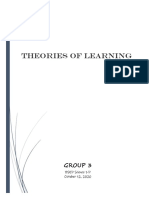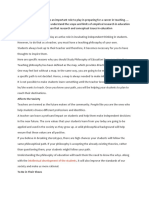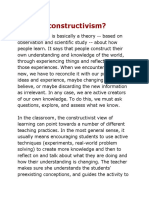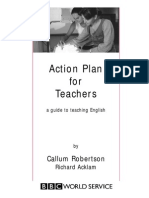Ed 62
Ed 62
Uploaded by
api-550734106Copyright:
Available Formats
Ed 62
Ed 62
Uploaded by
api-550734106Original Title
Copyright
Available Formats
Share this document
Did you find this document useful?
Is this content inappropriate?
Copyright:
Available Formats
Ed 62
Ed 62
Uploaded by
api-550734106Copyright:
Available Formats
1.
What are the four philosophical foundations of education presented in the pre-
recorded video? Write 3 sentences describing each philosophy. You can go on further
research to widen your understanding about the concept.
* Idealism- it is a mainly based on ideas, true to life experiences and the only worth
knowing. It is believed that the true nature of reality is based on an individual’s idea or
experiences. It is the view that there is no external reality composed of matter and
energy. There are only ideas existing within minds.
* Realism- it refers to the things that exist whether or not the human mind perceives
them. It concerns only the facts and literally only the truth. It doesn’t sugarcoat ideas
but only present what is certain.
* Existentialism- it is a theory that humans have their own control over their own
choices and actions. They have their own understanding and create own meaning based
on their opinion, idea, talent, etc. Also, they can solve problems on their own and able to
face life challenges without the help of others and can be creative in making ideas.
Existentialism in education can help students to be independent in learning.
* Pragmatism- it is an approach to things that focuses on practicality or the logic
response. It aims at developing students through activities and experiences or lessons
that cannot be forgotten and be brought until they get old. It is a way of teaching solving
problems in a practical way rather than complicating further.
2. How are these philosophies of education manifested in the classroom? Explain and
give concrete examples.
Idealism
This philosophy is manifested in the classroom by bringing out the ideas of the students.
They do individual report about a certain topic and let them pinpoint their own
understanding without the help of the teachers. The students build new ideas which can
create new knowledge.
Realism
Realism in the classroom focuses on factual ideas and knowledge. It should be highly
structured and organized and follow certain steps in acquiring knowledge. Teachers
should teach only what are accurate to prevent student from learning untrue ideas.
Realism also focus on writing, reading and arithmetic of the students.
Existentialism
Existentialism in the classroom is when students show their creativity in learning. It is
when they use their abilities on how they will perceive things clearly. It is learning on
their own way and teachers should be aware on how their student cope up knowledge.
By the help of this philosophy, it can effectively help students learn and teachers can
focus on the areas where the student cannot understand. A great example of
existentialism is when students do collaborative activities. They can express their own
ideas on the topic and can share it to others and merge their opinion to be able to come
up with the right answers. This task helps students think critically because they perceive
knowledge without the teachers’ help but with the collaboration of their ideas and
others.
Pragmatism
Pragmatism is a student-centered approach. It focuses on the practical way of solving
problems and other situations instead of complicating it. An example of using
pragmatism is using technology instead of going to the school in this time of pandemic.
It prevents us from the virus and help maintain good health. Doing the online class
helps the problem of our situation today. It makes us stay at home and learn in the same
time.
3. Which of the philosophies of education presented would you like to adhere. Why?
Expound your answer.
The philosophy like to adhere would be the Existentialism philosophy. This help
challenge my students in expressing themselves and to be able to understand them
personally based on their beliefs, opinions, and ideas. This can also help me from
learning on their ideas and expand my knowledge through the help of my students. It
would be a two-way process of learning inside our classroom because they will not only
learn from me but also, I can learn from them too and learn from their own ideas and
their classmates’. It benefits everyone in the classroom and help us learn effectively.
References
https://images.app.goo.gl/cUk4xvgfPcpXtB2n6
https://examples.yourdictionary.com/examples-of-existentialism.html
https://images.app.goo.gl/Vom9YDWzgUxoKAkX7
https://www.britannica.com/topic/realism-philosophy
https://prezi.com/s79wqiwgc59t/pragmatism-in-the-classroom/
You might also like
- Five Educational Learning TheoriesDocument4 pagesFive Educational Learning TheoriesKim Rose Borres100% (1)
- How to Teach Kids Anything: Create Hungry Learners Who Can Remember, Synthesize, and Apply KnowledgeFrom EverandHow to Teach Kids Anything: Create Hungry Learners Who Can Remember, Synthesize, and Apply KnowledgeNo ratings yet
- Chapter 1 Socially Responsible Teachers Rich With Philosophical Heritage PDFDocument7 pagesChapter 1 Socially Responsible Teachers Rich With Philosophical Heritage PDFrochelle yvonne regenciaNo ratings yet
- How to Teach Anything: Break Down Complex Topics and Explain with Clarity, While Keeping Engagement and MotivationFrom EverandHow to Teach Anything: Break Down Complex Topics and Explain with Clarity, While Keeping Engagement and MotivationRating: 4.5 out of 5 stars4.5/5 (4)
- EDU - Project Management Assistant Basic Education FSN-8Document4 pagesEDU - Project Management Assistant Basic Education FSN-8Yustinus EndratnoNo ratings yet
- Social Work MaterialDocument214 pagesSocial Work MaterialBala Tvn100% (2)
- Article 1 - Learing TheoriesDocument5 pagesArticle 1 - Learing TheoriesKavitha AlwisNo ratings yet
- Theories of LearningDocument7 pagesTheories of LearningShawn Henry CepedaNo ratings yet
- ED200 AssignmentDocument4 pagesED200 AssignmentKristel Joy ManceraNo ratings yet
- Fle 200 - Response Paper 3 - Fehmi Arda Yilmaz - 2436582Document2 pagesFle 200 - Response Paper 3 - Fehmi Arda Yilmaz - 2436582api-533470008No ratings yet
- Exercises For Module 2Document9 pagesExercises For Module 2Kimverly Gahum De LeonNo ratings yet
- A-VED 311-Requirements For Midterm - Mrs. Condeza PDFDocument15 pagesA-VED 311-Requirements For Midterm - Mrs. Condeza PDFgenelyn gunoNo ratings yet
- Assignment No.1 (Rommel Alonzagay)Document5 pagesAssignment No.1 (Rommel Alonzagay)Rommel Samonte AlonzagayNo ratings yet
- Chapter1 TPDocument10 pagesChapter1 TPKayezelle VillanuevaNo ratings yet
- Report ScriptDocument4 pagesReport ScriptNoo BoddieNo ratings yet
- LESSON NO. 2 The Teaching and The ProfessionDocument17 pagesLESSON NO. 2 The Teaching and The Professionrieann leonNo ratings yet
- Philosophy of Education (EDU 601) : IdealismDocument4 pagesPhilosophy of Education (EDU 601) : IdealismMuhammadRizwanNo ratings yet
- Answered CompreDocument30 pagesAnswered CompreMargei CutadNo ratings yet
- Philosopies of Education Pertaining To Language AcquisitionDocument3 pagesPhilosopies of Education Pertaining To Language AcquisitionMichael Timkang BulawanNo ratings yet
- DeepenDocument6 pagesDeepenlerma bisagarNo ratings yet
- Affects The Society: Intellectual Development of The StudentsDocument11 pagesAffects The Society: Intellectual Development of The StudentsBrile SuaNo ratings yet
- Allama Iqbal Open University, IslamabadDocument14 pagesAllama Iqbal Open University, IslamabadSafdar RajputNo ratings yet
- Philosophy of Education (Autosaved)Document53 pagesPhilosophy of Education (Autosaved)Joana MarieNo ratings yet
- Behaviorist Theories: Learning Theories Are An Organized Set of Principles Explaining How Individuals AcquireDocument14 pagesBehaviorist Theories: Learning Theories Are An Organized Set of Principles Explaining How Individuals AcquirePrakruthiSatish100% (2)
- Edu 601Document4 pagesEdu 601MuhammadRizwanNo ratings yet
- Educ 17-Module-1 PDFDocument11 pagesEduc 17-Module-1 PDFNad DeYnNo ratings yet
- Lesson 4 Beetc 680Document5 pagesLesson 4 Beetc 680ayeshastudies888No ratings yet
- Critical PedagogyDocument7 pagesCritical PedagogyprabhajeswinNo ratings yet
- Linking Critical Theory and Critical ThinkingDocument7 pagesLinking Critical Theory and Critical ThinkingAanica VermaNo ratings yet
- Pragmatism ScriptDocument20 pagesPragmatism ScriptEdnalyn B. NacionNo ratings yet
- Principles of LearningDocument4 pagesPrinciples of LearningJoy Mae MoralesNo ratings yet
- Philosophy GuideDocument7 pagesPhilosophy GuideWinzkie DumdumayaNo ratings yet
- Humanism Learning TheoryDocument3 pagesHumanism Learning TheoryEdy Ut75% (4)
- What Are Learning Theories in EducationDocument6 pagesWhat Are Learning Theories in EducationTanveer HussainNo ratings yet
- Learning TheoristsDocument7 pagesLearning TheoristsIsabel MartinezNo ratings yet
- Teacher in Idealist-Inspired ClassroomDocument11 pagesTeacher in Idealist-Inspired Classroomapi-453396068No ratings yet
- 5 Observations DoneDocument6 pages5 Observations Doneapi-384852100No ratings yet
- Teacher in Idealist Inspired ClassroomDocument10 pagesTeacher in Idealist Inspired ClassroomKriselle Nagera0% (1)
- Ed202 Module 1 - Lesson 2Document4 pagesEd202 Module 1 - Lesson 2Heather Dawn BuladoNo ratings yet
- Teaching PreparationDocument69 pagesTeaching PreparationMoe ElNo ratings yet
- Theories and Practice of Educational ManagementDocument29 pagesTheories and Practice of Educational ManagementJennelyn MaltizoNo ratings yet
- Subject: ED 200 Subject Description: EDUCATIONAL PHILOSOPHYDocument3 pagesSubject: ED 200 Subject Description: EDUCATIONAL PHILOSOPHYRichie MacasarteNo ratings yet
- Activity 3: 1. With That Educational PhilosophyDocument4 pagesActivity 3: 1. With That Educational PhilosophyJewel Rombaiz100% (2)
- Module 14-18Document4 pagesModule 14-18Erika Joy GutierrezNo ratings yet
- Edu601 Assignment 1 Idea Solution (kwNksY)Document2 pagesEdu601 Assignment 1 Idea Solution (kwNksY)Neha NoorNo ratings yet
- Classroom ManagementDocument4 pagesClassroom ManagementOn A MissionNo ratings yet
- Methapors and Learning TheoriesDocument15 pagesMethapors and Learning TheoriesJermer TabonesNo ratings yet
- Phylosophy of Educaton (Pragtisme)Document5 pagesPhylosophy of Educaton (Pragtisme)Juwita PardedeNo ratings yet
- Educ 8 PragmatismDocument3 pagesEduc 8 PragmatismSylvia DanisNo ratings yet
- Theories of Congruent CommunicationDocument4 pagesTheories of Congruent CommunicationAzeeman kid100% (2)
- What Is ConstructivismDocument18 pagesWhat Is ConstructivismMa'am Kin100% (2)
- My Reaction On The Idealism PrinciplesDocument12 pagesMy Reaction On The Idealism PrinciplesJun Cueva Comeros100% (2)
- Principles of LearningDocument4 pagesPrinciples of LearningLavinia FernandezNo ratings yet
- Educ 205 Online Activity 2 - GACAYANDocument3 pagesEduc 205 Online Activity 2 - GACAYANPrincess Alyssa Villar GacayanNo ratings yet
- Principles of Learning: A C T I V I T YDocument7 pagesPrinciples of Learning: A C T I V I T YLester SardidoNo ratings yet
- A Reflection On The Philosophies of EducationDocument5 pagesA Reflection On The Philosophies of EducationJohn Philip Wilson Marteja100% (1)
- Escoto Jenny-Final Exam - Ftc1-5-Learning-TheoriesDocument6 pagesEscoto Jenny-Final Exam - Ftc1-5-Learning-TheoriesJenny EscotoNo ratings yet
- Cognitivism Learning TheoryDocument26 pagesCognitivism Learning TheoryMiralona RelevoNo ratings yet
- Assignment 1Document4 pagesAssignment 1MELISHA RAJ A MBANo ratings yet
- Principles of LearningDocument7 pagesPrinciples of LearningALjun AlonNo ratings yet
- Edu Assignment 5Document4 pagesEdu Assignment 5api-260863548No ratings yet
- Lesson 5Document6 pagesLesson 5Christine Joy FernandoNo ratings yet
- Log 8Document1 pageLog 8api-550734106No ratings yet
- Log 7Document2 pagesLog 7api-550734106No ratings yet
- Log 1Document1 pageLog 1api-550734106No ratings yet
- Organizational LeadershipDocument10 pagesOrganizational Leadershipapi-5507341060% (1)
- Governance of Basic Education Ra 9155 1Document6 pagesGovernance of Basic Education Ra 9155 1api-550734106No ratings yet
- School Culture School Climate 1Document4 pagesSchool Culture School Climate 1api-550734106No ratings yet
- Ed 62 2018 Creating A Positive School Culture 2Document20 pagesEd 62 2018 Creating A Positive School Culture 2api-550734106No ratings yet
- Classical Weberian Bureaucracy 2Document8 pagesClassical Weberian Bureaucracy 2api-550734106100% (1)
- Unit 2 Reflection-Strategies For Management of Multi-Grade TeachingDocument3 pagesUnit 2 Reflection-Strategies For Management of Multi-Grade Teachingapi-550734106No ratings yet
- MGT Seating ArrangementDocument5 pagesMGT Seating Arrangementapi-550734106No ratings yet
- Other Philosophies of EducationDocument4 pagesOther Philosophies of Educationapi-550734106No ratings yet
- Ed 62 1Document1 pageEd 62 1api-550734106No ratings yet
- Ed 52 - Multi-Grade Teaching The MentorsDocument5 pagesEd 52 - Multi-Grade Teaching The Mentorsapi-550734106No ratings yet
- Monograde Vs MultigradeDocument1 pageMonograde Vs Multigradeapi-550734106100% (1)
- Maths Plus - A Book of Mental Mathematics For Class-1Document57 pagesMaths Plus - A Book of Mental Mathematics For Class-1ZULFIKAR DABIR100% (1)
- Revised Bartels Lessonplan1 Cs WeeblyDocument6 pagesRevised Bartels Lessonplan1 Cs Weeblyapi-253521718No ratings yet
- GDECE104 - Assessment 1 - Task Description and RubricDocument3 pagesGDECE104 - Assessment 1 - Task Description and RubricRK userNo ratings yet
- Research and Publication EthicsDocument14 pagesResearch and Publication EthicsRekha SabojiNo ratings yet
- Action Plan For Teaching EngDocument44 pagesAction Plan For Teaching EngMatt Drew100% (39)
- Plant Growth With Pineapple Fertilizer: Vivien B. PermacioDocument11 pagesPlant Growth With Pineapple Fertilizer: Vivien B. PermacioRichel Ybañez Quiñones CataneNo ratings yet
- Toyota Kata Presentation From Keith DeibertDocument44 pagesToyota Kata Presentation From Keith DeibertLakshitSeth100% (3)
- Inerpreting Test ScoresDocument2 pagesInerpreting Test ScoresSeri Teja Aulia0% (1)
- Episode 6Document9 pagesEpisode 6Joselito CepadaNo ratings yet
- J. Jacob Kirksey: Current PositionDocument11 pagesJ. Jacob Kirksey: Current PositionKatherine AndersonNo ratings yet
- Demetrio T. Aba JRDocument4 pagesDemetrio T. Aba JRArcide Rcd ReynilNo ratings yet
- Reflection Notes 2 Use of Zip Grade in Assessing Student Learning PDFDocument2 pagesReflection Notes 2 Use of Zip Grade in Assessing Student Learning PDFceledonio borricano.jrNo ratings yet
- TitanicDocument7 pagesTitanicRaghu RamNo ratings yet
- Social Dimension Chapter 2Document18 pagesSocial Dimension Chapter 2Raymart Cabrera Ricamata0% (1)
- Interchange 3ed Teacher Lev1 Unit7Document6 pagesInterchange 3ed Teacher Lev1 Unit7isaacfg1No ratings yet
- Elnglish LPDocument17 pagesElnglish LPJhon Allenn BulawanNo ratings yet
- References For Motivation and IncentivesDocument2 pagesReferences For Motivation and Incentiveskitson200100% (1)
- Final Examation - Level 3BDocument5 pagesFinal Examation - Level 3BSamuel MatsinheNo ratings yet
- Henry Viii Homework SheetsDocument5 pagesHenry Viii Homework Sheetsvmwwwwmpd100% (1)
- ML Lab ManualDocument40 pagesML Lab ManualvarshaNo ratings yet
- FEUDocument149 pagesFEURobin SicatNo ratings yet
- 2 - How The World WorksDocument12 pages2 - How The World WorksGEETHA NARAYANAN HOMEROOM - PRIMARY-SLM-MAINNo ratings yet
- Search For MRDocument27 pagesSearch For MRamara de guzmanNo ratings yet
- Mandatory disclosure-2009-2010-MCADocument11 pagesMandatory disclosure-2009-2010-MCAVikash KumarNo ratings yet
- Ernollment PMV Aug 2022Document6 pagesErnollment PMV Aug 2022The Journey Skills Training Institute IncorporatedNo ratings yet
- Poon Wai ChingDocument15 pagesPoon Wai ChingRyan Yu SyuenNo ratings yet
- Report On Promotions: Deped Form 18-E-2 56 0 56Document8 pagesReport On Promotions: Deped Form 18-E-2 56 0 56Precilla HalagoNo ratings yet
- English 6 DLP 17 Giving The Main IdeaDocument14 pagesEnglish 6 DLP 17 Giving The Main IdeaRonaldo YabutNo ratings yet







































































































